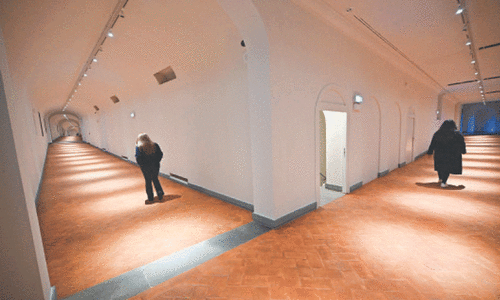
• Tel Aviv tells UN it is cutting ties with Palestinian aid agency
• Settlers burn cars in West Bank attack
• Hundreds of houses detonated by Israelis in Lebanon border village
CAIRO/BEIRUT: Israeli airstrikes killed at least 12 Palestinians in Gaza on Monday and residents said they feared new air and ground attacks and forced evacuations were aimed at emptying areas in the enclave’s north to create buffer zones against Hamas fighters.
The UN Palestinian refugee agency UNRWA said Israel was scaling back the number of aid trucks allowed into Gaza, compounding shortages of food, medicine and other essential supplies.
Israel said separately on Monday it had officially notified the United Nations that it was ending its relations with UNRWA, which has been a vital provider of aid to Palestinian civilians during the 13-month-long war between Israel and Hamas.
In the latest bloodshed, medics said seven people were killed in an attack on two houses in the north Gaza town of Beit Lahiya on Monday. Five more were killed in separate strikes in central and southern parts of the enclave, medics said.
Several people were wounded in the attacks, they said, adding that Israeli forces had sent tanks into the northeast of Nuseirat camp earlier on Monday.
Israel deployed tanks into Jabalia, Beit Hanoun, and Beit Lahiya on Oct 5, saying it intended to prevent Hamas fighters from regrouping.
Hospital bombing
The Palestinian Health Ministry said Israeli forces were continuing to bomb the Kamal Adwan Hospital and had injured many staff and patients.
“The medical staff cannot move between the hospital departments and cannot rescue their injured colleagues. It seems that a decision has been made to execute all the staff who refused to evacuate the hospital,” it said.
Palestinians said the new offensives and orders for people to leave were “ethnic cleansing” aimed at emptying two northern Gaza towns and a refugee camp to create buffer zones.
The Hamas-run Gaza government media office put the number of Palestinians killed since Oct 5 at 1,800. It said 4,000 others were wounded.
Humanitarian supplies
UNRWA head Philippe Lazzarini said on Monday that Israel has scaled back the entry of aid trucks into the Gaza Strip to an average of 30 trucks a day, the lowest in a long time. This represented only 6 per cent of the commercial and humanitarian supplies that used to enter Gaza before the conflict, he said.
“This cannot meet the needs of 2 million people, many of whom are starving, sick, and in desperate conditions,” Lazzarini said on X.
Earlier on Monday, Israel’s foreign ministry said it had officially notified the United Nations it was cancelling the agreement that regulated its relations with UNRWA since 1967 — effectively banning it.
“Restricting humanitarian access and at the same time dismantling UNRWA will add an additional layer of suffering to already unspeakable suffering,” Lazzarini said.
Settlers torch 20 cars
Israeli settlers torched nearly 20 cars on Monday in the occupied West Bank city of Al-Bireh near Ramallah, according to the Palestinian civil defence and an Israeli security source.
A journalist saw several cars completely charred, and the blackened facade of the five-storey building outside which they were parked.
An alert rang “at 3:30am (0130 GMT) signalling that settlers entered the area and committed acts of vandalism”, said Rami Omar, head of the local civil defence office.
An Israeli security official said notification of the incident came at 4:00 am and soldiers were sent who arrived on site after the settlers had gone. The official, who was not authorised to speak publicly on the matter, said 19 vehicles had been burned by settlers.
Israeli police, soldiers and Shin Bet security agency officers collected evidence in Al-Bireh for the investigation, the official added. Israeli authorities did not yet know where the settlers came from and what their motives were.
Houses detonated
Footage verified by a news agency on Monday showed massive detonations in a southern Lebanese border village, where a local official said hundreds of houses have been wiped out by Israel since last year. The video, shared widely online on Monday, showed more than a dozen simultaneous detonations that ripped through Mais al-Jabal and razed homes to dust.
Similar aerial scenes have been captured from several border villages, including Mhaibib and Odaisseh, since Israel sent ground troops into southern Lebanon in late September.
Houses covering lush hills are seen crumpling in a cloud of grey dust in the videos circulating widely online.
Israel says it is targeting Hezbollah infrastructure near the frontier in a bid to push the Iran-backed group away from the border and allow for its residents to return to northern Israel.
Monday’s video from Mais al-Jabal showed large detonations near a vacated hospital in the village, said mayor Abdul-Monhem Choukair.
The area has been repeatedly struck since Israel and Hezbollah started trading cross-border fire in October last year.
“Seventy percent of Mais al-Jabal is destroyed,” the mayor said, adding that the “Israeli enemy’s goal is systematic destruction”.
Choukair said four people, aged between 85 and 90, are trapped in Mais al-Jabal pending their rescue.
According to Lebanon’s official National News Agency (NNA), Israeli troops dynamited buildings in at least seven border villages last month.
Israel’s Channel 12 last month broadcast footage appearing to show one of its presenters blow up a building while embedded with soldiers in the village of Aita al-Shaab.
Lebanon’s National Human Rights Commission has said “the ongoing destruction campaign carried out by the Israeli army in southern Lebanon is a war crime”. Between October 2023 and October 2024, locations “were wantonly and systematically destroyed in at least eight Lebanese villages”, it said.
Published in Dawn, November 5th, 2024














































Dear visitor, the comments section is undergoing an overhaul and will return soon.